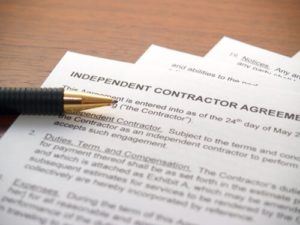Long Island Employees and Independent Contractors Lawyer
Law Office of Cohen & Jaffe, LLP.
Many businesses prefer to have their work performed by independent contractors rather than employees in order to avoid employment taxes and employee benefit costs. Workers should be aware, however, that employees are often misclassified as independent contractors and that employees are entitled to benefits and legal protections that independent contractors are not.

Rights Employees have that Independent Contractors Don’t
Although there may be advantages to working as an independent contractor, employees have rights and benefits that independent contractors do not. For example:
 Employees are protected under state and federal laws, such as minimum wage and overtime laws, which do not apply to independent contractors.
Employees are protected under state and federal laws, such as minimum wage and overtime laws, which do not apply to independent contractors.
 Most employees who are injured on the job or develop occupational illnesses are covered under workers’ compensation insurance, while independent contractors are not entitled to those benefits.
Most employees who are injured on the job or develop occupational illnesses are covered under workers’ compensation insurance, while independent contractors are not entitled to those benefits.
 Employees who are laid off may be eligible for unemployment insurance benefits, while independent contractors have no such protection when they are out of work.
Employees who are laid off may be eligible for unemployment insurance benefits, while independent contractors have no such protection when they are out of work.
 Employees have FICA taxes withheld from their gross wages (7.65%) and matched by their employers, while independent contractors have to pay both the employee and the employer portions of FICA (15.3%) to the IRS.
Employees have FICA taxes withheld from their gross wages (7.65%) and matched by their employers, while independent contractors have to pay both the employee and the employer portions of FICA (15.3%) to the IRS.
When is an ‘Independent Contractor’ Actually an Employee?
According to the Department for Professional Employees (DPE), AFL-CIO, employer misclassification of employees as independent contractors is widespread, affecting millions of workers in the U.S. A worker is not necessarily an independent contractor simply because an employer says he or she is. Many employers misclassify workers as independent contractors who are actually legally employees and should be entitled to an employee’s rights and protections.
 The difference between an employee and an independent contractor goes beyond the job title.
The difference between an employee and an independent contractor goes beyond the job title.
As discussed by DPE, independent contractors are essentially self-employed individuals who treat their employers as clients or customers and often have more than one client.
 They provide goods and services to a business or individual under the terms of a contract, while retaining control over how they provide the goods and services.
They provide goods and services to a business or individual under the terms of a contract, while retaining control over how they provide the goods and services.
As stated by DPE, while some employers misclassify employees as independent contractors in error, others do it intentionally, the main incentive being the labor cost savings on Social Security taxes, unemployment insurance and Medicare taxes.
 Employers have other incentives as well to misclassify workers, according to DPE:
Employers have other incentives as well to misclassify workers, according to DPE:
- It frees them from responsibilities under labor and employment laws, such as minimum wage and hours laws, which are based on employer-employee relationships.
- It may serve to circumvent employee civil rights protection under laws enforced by the federal Equal Employment Opportunity Commission (EEOC).
- As independent contractors are not protected under the National Labor Relations Act, some employers may misclassify workers in order to inhibit union organizing.
- It can save money on benefits typically provided by a company to employees, such as health and pension plans.
- Some employers may misclassify employees as independent contractors so they will not be required to verify that their workers are U.S. citizens or have work visas.
How does the Law Determine Misclassification?
As discussed by the New York State Department of Labor (NY DOL), no single factor determines an employer-employee relationship, but rather a combination of factors are examined to determine the degree of control, supervision and direction the employer has over the work performed.
 Generally, if the employer controls the worker’s services, then the worker is an employee.
Generally, if the employer controls the worker’s services, then the worker is an employee.
The IRS has an interest in misclassification of employees because of its impact on tax revenues. It uses three characteristics to determine whether a worker is an employee or an independent contractor:
 Behavioral control.
Behavioral control.
Does the business have the right to control how the work is done, for example, through training and instruction? If it does, the worker is likely an employee. Financial control.
Financial control.
Does the business have the right to direct or control financial and business aspects of what the worker does? This involves questions such as whether expenses are reimbursed and who provides tools and equipment. Type of relationship.
Type of relationship.
This characteristic concerns the way in which business owners and workers perceive the relationship. Are there employee-type benefits, such as insurance, vacation or a pension plan? Is the work performed a key aspect of the business?
The IRS also states that if a business has the right to control not only what is done, but how it is done, then the workers are most likely employees. On the other hand, if a business can control only the result of the work done and not the method of accomplishing it, according to the IRS, the workers are most likely independent contractors.
As stated by the NY DOL, independent contractors are in business for themselves and offer their services to the general public. They are also free from supervision, control or direction in the services they provide. According to DOL, independent contractor status may exist when workers:
- Have an established business
- Advertise in electronic or print media or the Yellow Pages
- Have business cards and stationery
- Pay their own expenses
- Set their own schedules
- Negotiate or set their own pay rates
- Are free to refuse offers of work
- Carry insurance
- May hire help if they choose
- Offer services to other businesses
- Assume risk for profit or loss
- Have a place of business and invest in equipment, supplies and facilities
Our Long Island Lawyers Help Workers Get Full Benefits
At the Law Office of Cohen & Jaffe, LLP we protect the rights of workers. If you have been incorrectly classified as an independent contractor in New York and denied your rightful benefits and protections under the law, our Long Island employment attorneys will take your side and stand up to your employer or anyone who has violated your rights.
Our objective is to see that you are treated fairly under the laws of New York and the U.S. If this includes compensation for the way you have been treated, we will pursue it aggressively on your behalf.
Find out how we can help you today. You can reach our Long Island employment lawyers by phone or by filling out our online contact form.
Sources:









